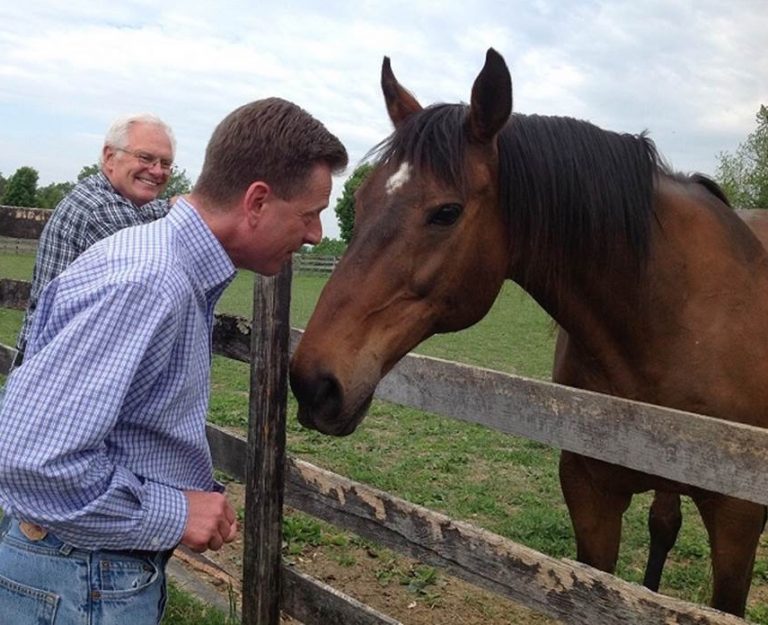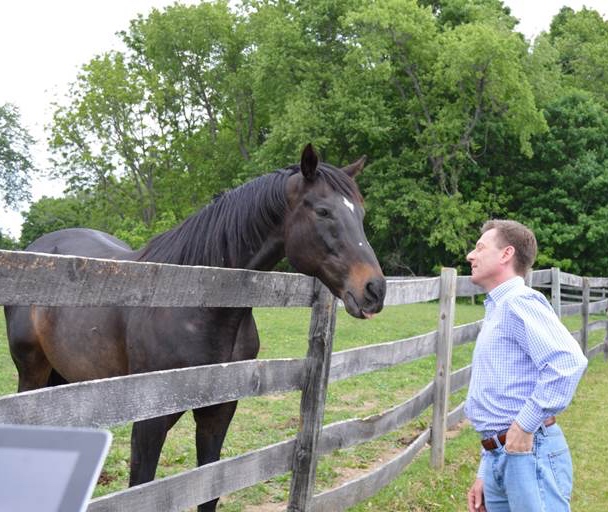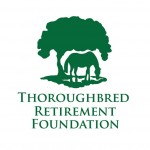
Richard “The Mig” Migliore visits with CL Rib at the Thoroughbred Retirement Foundation’s facility in Wallkill, N.Y.
Days before Triple Crown hopeful American Pharoah was set to blast off from post-position 5 at Belmont Park, an award-winning jockey turned sportscaster, and nicknamed for a Russian fighter jet, spoke of the need in the horse world and racing industry to take care of its equine athletes.
Richard “The Mig” Migliore, an Eclipse Award winning jockey who tenaciously piloted horses to close to 4,500 wins in a storied career, says that horses brought him “everything good in my life” and now that he is retired from horse racing, he seeks to “pay them back” from his vantage on the Board of Directors of theThoroughbred Retirement Foundation (TRF).
Fresh from a recent visit to the TRF’s Wallkill, N.Y. facility, where 45 Thoroughbred ex-racehorses receive care from inmates in the horsemanship skills program Second Chances, Migliore says he has thought a lot about what happens to racehorses after their careers end, and of the absolute necessity for the sport to find a way to take care of its horses.
“I will say this. I believe it’s incumbent upon the industry, and anybody who has derived any pleasure from a horse, to make sure they’re taken care of,” Migliore says. “A lot of these horses have very short careers. Everybody’s very aware of them when they’re racing, and while people are gambling on them and they’re making money for people.
“But they’re quickly forgotten unless they go to stud or become broodmares.”

Bubba Sparks greets Migliore during the Eclipse Award winning jockey’s visit to the TRF facility in NY.
Since joining the TRF last October, Migliore has been thinking hard about aftercare issues facing ex-racehorse Thoroughbreds, and says he hopes to help craft a plan of action that the industry might embrace.
“The fact that I had so much success as a rider, I feel it is my responsibility to give back to the horses. Horses have given me everything good in my life, from the tangible things like my house and little farm, and my car, to even meeting my wife Carmela. So, everything good has come from them.”Since joining the TRF last October, Migliore has been thinking hard about aftercare issues facing ex-racehorse Thoroughbreds, and says he hopes to help craft a plan of action that the industry might embrace.
On a recent afternoon, Migliore hopped in his car and drove 45 minutes to the Wallkill facility to speak to inmates about two very special horses in the herd they care for. Stakes placed Ohio bred CL Rib and New York bred Bubba Sparks, two mounts Migliore rode in the early 2000s, greeted him at the fence.
He brought pictures of the horses taken during their glory days, and told stories about the old days. And afterwards, Migliore felt more than just a little enlightened from the experience.
“I can be a little harsh with people who don’t do the right things, I guess. But after speaking with the guys there, I had such empathy,” he says. “Speaking with these guys, I could tell they wanted to change their lives, and I could see the pride they had in the care they were giving the horses. I was really touched to see how much of a difference these horses are making in their lives.”
Now if only those who enjoy the Belmont Stakes on Saturday, and all of the people who are themselves touched by a horse, will help care of the beautiful animals who give so many hope.— Originally published on June 5, 2015.


I have two OTTBs, both not sound enough for big jumping but just fine for trail riding. It has to start with less volume of horses bred, breed more quality and sounder horses. Stop backyard breeding and flooding the industry with low quality horses that don’t have the bone, land up with bad trainers who run them into the ground, they break down and are good for nothing after that!!! It’s so sad….
There are 5 OTTB,s in a kill pen right now in PA. Yes, something needs to be done to help these horses!! It’s getting to be too much for those that fund raise and rescue week after week! Homes are getting harder and harder to find!!
Lindy: It’s an endless cycle. Though it’s SO wonderful when individuals and charities step up to take horses for a lifetime, it seems that the kill pens fill up with an endless supply of discarded horses. There’s so much positive going on. The Thoroughbred Aftercare Alliance was begun to help connect the race industry to Thoroughbred charities, and the work the alliance does scrutinizing the charities to ensure dollars are spent where they’re earmarked helps build confidence in the program. And yet, this effort is only a tiny effort in the face of the sheer volumes of horses headed to slaughter. The problem is so obvious. I’d like to see more solutions.
As President of the Equine Rescue and Adoption Foundation, we are most interested in your plan of action. We take many off the track horses and help them rehabilitate and find a new loving home. Please keep us in the loop.
It was one of the things that has always bothered me about racing. I remember one claiming horse that kept on racing and kept on winning. He was a big silly guy and they raced him and raced him, until one day he was gone. I always wished I had the money to buy him. I would have loved to keep him. Thank you for what you’re doing! It makes me smile!
Thank you, Richard. I am so happy you are taking this issue on! As author of the Winning Odds Series, which addresses this issue – if there is anything I can do to assist you please let me know.
“With Wire to Wire ~ the continuing story of the behind-the-scenes everyday life in the Thoroughbred racing industry, MaryAnn Myers steps out on a bold limb. “I love Thoroughbreds, I love the racetrack, but…” says Myers. “We need to examine the practices of old and re-evaluate the new standards. We need to always, and I mean always, put the horses’ and jockeys’ safety first. Racing is all about winning, yes, as with most competitive sports. But it is also about the integrity of the sport. Owners and trainers need to be held accountable for the Thoroughbreds they breed and own. These horses run their hearts out, because that’s what they were bred to do and that is what they love. But they have no choice of where to go after they are no longer competitive. That is where the integrity of ownership comes in. Everyone involved needs to make a commitment up front to the long respectful life of that Thoroughbred. It’s as simple as that.”
HI! Eileen Sutley!! that is so very GOOD to read your comment up above!! My best to you & your farm.& family for holding on to your OTTBs or other horses, too. God Bless you, all!!~ Rebecca Hill~
Still waiting to hear about the plan that Richard is crafting…it’s been more than a year since this was posted. A follow up with him might be worthwhile.
Richard God bless you . We need more
people like you to speak up about taking
care of our horses after they no longer
run. All my horses have always been off
the track and I have every one of them.